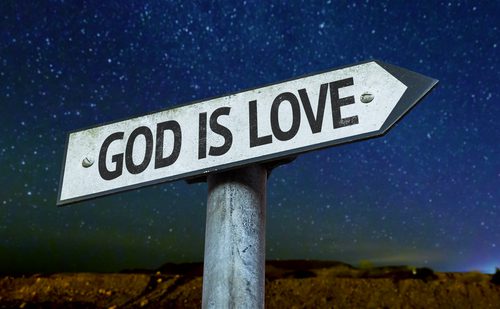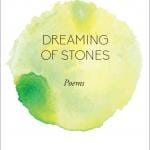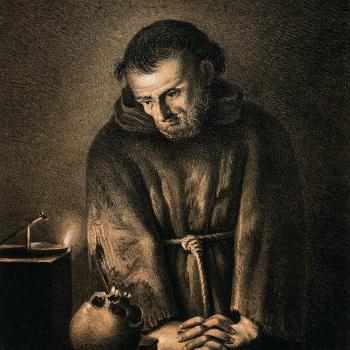A reader named Beth writes:
Hi Carl, I started reading “The Big Book of Christian Mysticism” and have a question for you… In chapter 1 you make the point of understanding the text from a Christian perspective which makes the distinction between being identical with God vs. communion with God. That subject has always perplexed me. If the spiritual realm is not material it therefore may not comply to matters of separation. How can we understand that statement given that we only experience the realm of the spirit in a non materialistic sense?
Here is the line she has in mind, found on page 20 (Kindle location 180):
…we must also acknowledge the real differences that distinguish Christian mysticism from world mysticism. For example, many forms of non-Christian mysticism are anchored in the idea that human beings are (or can become) identical with God. Christianity denies this, and Christian mysticism concurs. Christian mysticism pursues participation with God, communion with God, and even experiences of union with God, but always distinguishes creator from creature. To deny that distinction is to move away from Christian mysticism, even if you talk about Jesus all the time.
When I was in high school, I read Paramahansa Yogananda’s Autobiography of a Yogi. It was my introduction not only to Hinduism, but to eastern spirituality in general. Yogananda came to America where he founded an organization called the “Self-Realization Fellowship.” Following the traditional Upanishadic teaching of Tat Tvam Asi (“that art thou” or “that is you”), there is a long-standing idea in eastern wisdom that the “Ultimate Reality” and the Self (or what Thomas Merton might call “the True Self”) are ontologically one.
There’s plenty of language from the Christian mystics that suggests a similar way of embodying Divine Union. Consider the classic line from Meister Eckhart’s Sermon 16:
The eye with which I see God is exactly the same eye with which God sees me. My eye and God’s eye are one eye, one seeing, one knowledge and one love.
Or this juicy tidbit from the Cistercian mystic, St. Bernard of Clairvaux:
As a drop of water poured into wine loses itself, and takes the color and savor of wine; or as a bar of iron, heated red-hot, becomes like fire itself, forgetting its own nature; or as the air, radiant with sun-beams, seems not so much to be illuminated as to be light itself; so in the saints all human affections melt away by some unspeakable transmutation into the will of God. For how could God be all in all, if anything merely human remained in man? The substance will endure, but in another beauty, a higher power, a greater glory.
Quotations like these point to what contemporary Christian contemplatives might call nonduality. Borrowing a concept from eastern spirituality, in a Christian sense nonduality is the recognition that a profound spiritual unity exists between God and God’s creation, even though there is also a recognized distinction between Creator and creature. That may seem contradictory, although it’s more properly seen as paradoxical. Let’s unpack it.

The Ocean and the Drop
Christianity has not only historically insisted that there always remains a distinction between creator and creature, it has gone so far to attack mystics who seem to erase that distinction — a chief reason why Meister Eckhart was accused of heresy. As one spiritual director of mine used to say bluntly, “God is god, and you are not.”
This quotation from another Cistercian mystic, William of St. Thierry, sheds some light on this Christian view:
When the soul reaches out in love to anything, a certain change takes place in it by which it is transmuted into the object loved; it does not become of the same nature as that object, but by its affection it is conformed to what it loves.
A similar note comes from the Carmelite mystic, St. John of the Cross:
Love never reaches perfection until the lovers are so alike that one is transfigured in the other.
Christianity teaches that even when the experience of Union with God is so profound and immersive that it seems as if there is no distinction, in point of fact, merely to be able to have that experience points to a discrete consciousness that is “other” than the All. To make an analogy: a drop of water is not the same thing as the ocean. But if you place a drop of water into the ocean, it will “feel” as if it were one with the entire ocean. And yet, it is still just a drop. The drop cannot experience what the entire ocean experiences, but the drop does “experience” a sense of oneness with the ocean. But that experience is, by its very nature, a “drop experience” rather than an “ocean experience.” The ocean doesn’t have to experience oneness with the drop, for the ocean just simply is. The drop experiences union, whereas the ocean simply loves.
And that, ultimately, is the key to what makes mystical Christianity (indeed, all western theistic mysticism) unique. Since the foundation of western mysticism is love, it always sees the heart of the mystical experience as a union of lovers — they become one, yet they always remain distinct on some profound level. That distinction is not a flaw, a fault, or a weakness. It’s how things are designed.
But keep in mind: at the highest summit of mystical prayer, the human consciousness will not experience any separation. We will “feel” one with God — and indeed, we are as fully united with God as the drop of water is at one with the ocean. So trust the feelings and the experience! But trust them with the humility of recognizing that just as a drop of water cannot by its very nature experience the fullness of the ocean, so too we human creatures cannot experience the fullness of God.
And that’s okay.
As one friend of mine jokingly puts it, “I have no desire to be creating supernovas.”

Separation and Creation
Now, to directly address Beth’s question: “If the spiritual realm is not material it therefore may not comply to matters of separation.” In Christian mysticism, at least as I have been taught, the orthodox view does not emphasize a distinction between “spiritual” and “material.” Rather, mystical Christianity (indeed, all orthodox Christianity) is sacramental and incarnational which is to say, that spirituality and materiality co-inhere. We know that miracles happen, which right aways proves that human understandings of the laws of physics or the laws of nature is limited and incomplete. What’s true in a strictly material sense is also true in a spiritual sense. There’s just too much we don’t know.
For Christian mystics, “separation” and “creation” are two different things. I am a creature, but I am not separate from God — either spiritually or materially. It’s a Biblical teaching that the Holy Spirit has been poured into our hearts. So God is present in our bodies. Yet “not being separate” does not imply that I might not feel separate (in fact, I usually do — that’s what Thomas Keating thinks is the fundamental problem of the human condition, that we feel like we’re separate from God even when in fact there is no separation). And just because I am not separate from God does not mean that I do not have the experience of being a discrete physical being, a sense of autonomous self-hood, an awareness of my life being finite (I was born, and I will die). Jesus promises me that my life will not end at physical death, but I cannot know that until I die. In the meantime, it’s a matter of faith.
So from the perspective of mystical Christianity, whether or not the spiritual realm “complies to matters of separation” is immaterial. All I have to go on is my own experience — but also the wisdom teachings I receive from others. I certainly can experience a sense of profound union with God, which would imply that, at least spiritually, there is no separation. But I also can view my limited, finite experience through the lens of Christian wisdom teaching, which assures me that I am merely experiencing what a drop experiences, not what the entire ocean experiences. I’m happy receiving that teaching, because it leaves room for me and God to keep falling ever-more-deeply in love. Frankly, I don’t want to be identical with God, because then the love I experience would just be narcissism. I am profoundly grateful that God gave me the gift of ontological otherness — that distinction between creator and creature is profoundly erotic and ecstatic, and promises me an eternity of ever-expanding joy.
Finally, Beth asks, “How can we understand that statement given that we only experience the realm of the spirit in a non materialistic sense?” I hope you will continue to explore mystical Christianity, because Christian mysticism, at its best, is all about experiencing “the realm of the spirit” in embodied, incarnational, sacramental, yes, even material ways. It shows up again and again in the tradition. St. Benedict said, “We believe the Divine Presence is everywhere.” Julian of Norwich agrees, “For the fullness of joy is to behold God in all.” St. Ignatius counseled his directees to “find God in all things.” This is not to erase the possibility of deeply spiritual encounters with the Divine; which might also be described as imaginal or transcendental or transpersonal. Christian mysticism has room for the most exalted “spiritual” experience — but it also finds God in our hearts and our bellies, in the good soil of the earth and the majestic silence of a tree, the rolling waves of the ocean and the scintillating sunlight that dances up on the waters. God is in it all. And Christian mysticism is the art of learning to see, to recognize, to feel, to embody, and to share that Divine Presence.
So Beth, I hope you’ll hang out with the Christian mystics for a while. Read Julian of Norwich, and Teresa of Ávila, and Hildegard of Bingen. Get to know Thomas Merton, and Thomas Keating, and Cynthia Bourgeault. Learn to pray with Martin Laird and John Cassian and The Cloud of Unknowing. You’ll find plenty of spiritual stuff, but also plenty of down-to-earth embodied God-present-here-and-now recognition as well. The God who is vast, limitless, giving Love is the God of both spirit and matter, profoundly transcendental and immediately immanent, where “material” and “non-material” are not-two.
Hope this is helpful. And thanks for reading The Big Book of Christian Mysticism!
Enjoy reading this blog?
Click here to become a patron.














